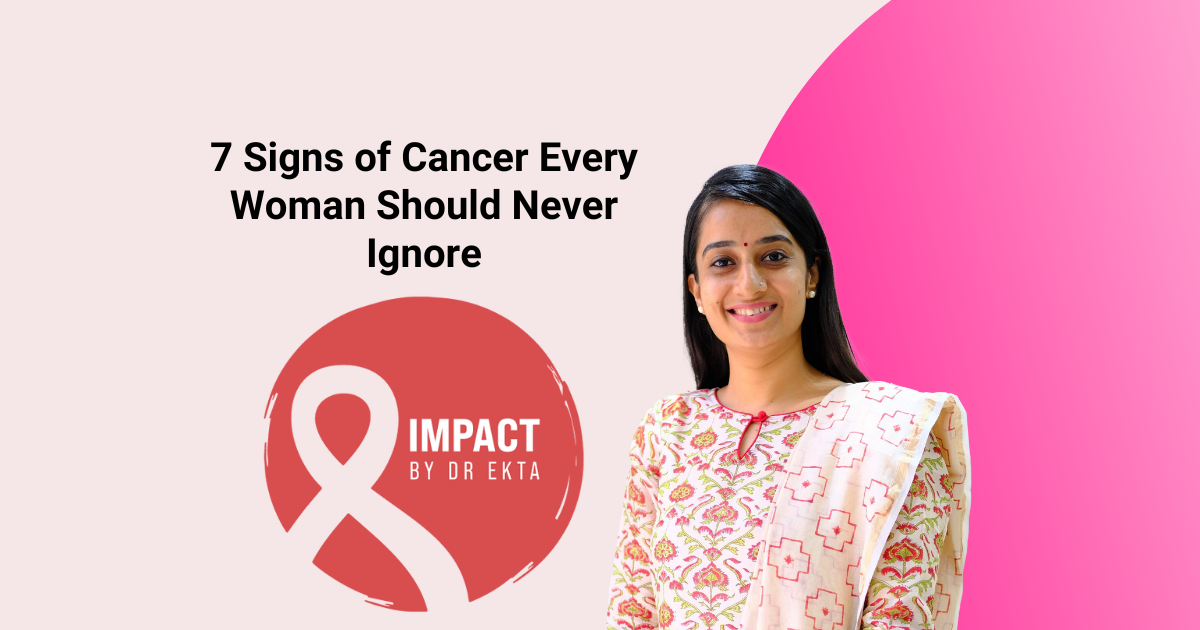Cancer can be silent, but your body often sends signals long before a diagnosis. Recognizing the early warning signs can help detect cancer in its earliest, most treatable stages. While not every symptom points to cancer, there are certain signs that women should never ignore. In this blog, we’ll break down the 7 signs of cancer that require medical attention, along with what they might mean and why prompt evaluation is essential.
1. Unexplained Weight Loss
Sudden, unintentional weight loss—especially if you haven’t changed your diet or activity level—can be a red flag. – Losing more than 4-5 kg without trying may indicate an underlying issue. – It may be linked to cancers such as stomach, pancreatic, lung, or ovarian cancer. – Cancer cells can increase metabolism or interfere with how your body absorbs nutrients.
What to do: If you’ve lost significant weight without trying, consult your doctor for a thorough evaluation.
2. Persistent Fatigue
Feeling tired after a long day is normal—but constant exhaustion that doesn’t improve with rest is not. – Cancer-related fatigue is deep, unrelenting, and doesn’t go away with sleep. – Blood cancers like leukemia or lymphoma often cause this kind of fatigue. – Other cancers may cause fatigue due to internal blood loss or chronic inflammation.
What to do: Track your energy levels. If tiredness is interfering with your daily life, speak to a healthcare provider.
3. Unusual Bleeding or Discharge
Abnormal bleeding is always a sign you should never ignore. – Postmenopausal bleeding or irregular periods could signal cervical, uterine, or endometrial cancer. – Blood in urine or stool might indicate bladder or colorectal cancer. – Nipple discharge—especially bloody—can be linked to breast cancer.
What to do: Keep a log of symptoms and consult a gynecologist or your physician promptly.
4. Breast Changes
Not every breast lump is cancerous, but changes in breast tissue warrant attention. – New lumps, swelling, or thickening in the breast or underarm – Changes in size, shape, or skin texture – Nipple inversion or discharge
What to do: Perform monthly self-exams and don’t skip routine mammograms. Any new change should be reported to your doctor.
5. Skin Changes
Your skin can reflect changes happening inside your body. – New moles or changes in existing moles (color, shape, size) – Sores that don’t heal – Yellowing of the skin (jaundice), which may be a sign of liver or pancreatic cancer
What to do: Use the ABCDE rule (Asymmetry, Border, Color, Diameter, Evolving) to assess moles and visit a dermatologist for changes.
6. Digestive and Urinary Issues
Chronic digestive issues or urinary symptoms can sometimes be signs of hidden cancers. – Persistent bloating or pain may be signs of ovarian or gastrointestinal cancers – Difficulty swallowing might indicate esophageal or throat cancer – Blood in urine, frequent UTIs, or incontinence can point to bladder cancer
What to do: If symptoms last more than a few weeks, don’t delay seeking medical advice.
7. Chronic Cough or Hoarseness
Lingering respiratory symptoms could be more than allergies or a seasonal cold. – A cough lasting longer than 3 weeks could be a sign of lung or throat cancer – Hoarseness might be an early sign of laryngeal cancer – Coughing up blood is an urgent red flag
What to do: Don’t ignore persistent coughs or voice changes. Especially important if you smoke or have a history of respiratory illness.
Why Early Detection Matters
Identifying these signs doesn’t mean you have cancer—but early detection can make a life-saving difference. – Early-stage cancers respond better to treatment – Regular screenings like Pap smears, mammograms, and colonoscopies help catch cancer before it spreads – Getting a second opinion after a diagnosis helps in confirming the right course of treatment.
Final Thoughts: Listen to Your Body
Women often prioritize everything except their health. But when it comes to recognizing the 7 signs of cancer, being aware and proactive is the best defense. – Don’t skip routine health checkups – Maintain a symptom journal – Know your family medical history – Reach out to your doctor if something feels off Taking charge of your health today could mean catching cancer early—and increasing your chances of a full recovery.
Need Help Navigating a Cancer Concern?
📞 Call us at 08866843843 to schedule a consultation or explore our cancer care blog for expert advice, tips, and patient support.

